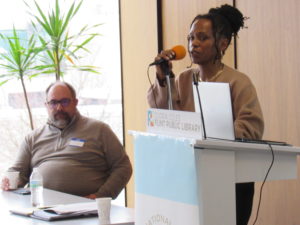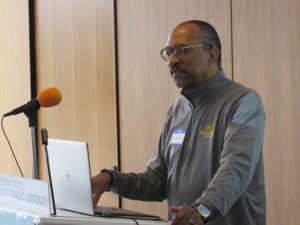By Harold C. Ford
“Immigrants are a breath of fresh air.” – Jennifer Alvey, University of Michigan-Flint, March 5, 2024
On Tuesday, March 5 a diverse group of more than 40 people from the Flint area gathered at the Gloria Coles Flint Public Library to launch the Global Flint Initiative (GFI), a cross-organizational effort to make the city “a welcoming community” to immigrants.
“It’s really important work that we are all embarking on … being a welcoming community,” Jim Ananich, vice president of GFI and former state legislator, said in his opening remarks. “One, it shows our values, but it also is good for our community in a number of ways.”
“We have a mission and that is to focus on attracting and retaining non-native foreign residents,” added Phyllis Sykes, the initiative’s president and executive director of the International Center of Greater Flint.

Phyllis Sykes, president of the Global Flint Initiative, speaks during a launch event for the initiative on March 5, 2024 at the Gloria Coles Flint Public Library. (Photo by Harold Ford)
Sykes added that GFI is first focused on determining the needs of Flint’s non-native population, so over the next several months the initiative will collect information from surveys, focus groups, and interviews to “ascertain what the needs are so that we can come up with a strategic plan on how to address those needs, thereby making Flint a welcoming and engaging community.”
Organizations represented at the event included: Greater Flint Arts Council, Latinx Technology & Community Center; Mass Transportation Authority; Michigan Works! Association; Flint & Genesee County Chamber; Huntington Bank; and the South Side Community Coalition.
Additionally, participants from two of Flint’s major institutions of higher learning – University of Michigan-Flint, and Kettering University – played leadership roles in the nearly 90-minute meeting. A representative from Mott Community College was also present.
“An image problem”
Overshadowing the effort, perhaps, to craft and implement a strategic plan is the wider public’s perception of Flint, Sykes and other officials noted.
Sykes illustrated that challenge during her introduction of four Kettering graduate students who self-identified themselves for East Village Magazine (EVM) as: Mukhesh Sivakumar from India; Raquibul Islam from Bangladesh; and Sameer B. and Vivek C., both from India.
Sykes said that when Islam arrived in Michigan at Detroit Metropolitan Airport, an Uber driver “warned him about coming to Flint” saying something along the lines of, “‘Beware, you don’t want to go to Flint … Whatever you do, don’t go outside.’”
The warning led Islam to secure housing in the Detroit area and commute daily to and from Flint in order to attend Kettering.
“We have a major P.R. [public relations] problem here in Flint,” Sykes said. “Unfortunately, we’re dealing with an image problem that Flint has that hinders us from being a welcoming community.”
Needs assessment and next steps
As part of determining the needs of Flint’s current and potential nonnative population, March 5 participants were divided into four groups that brainstormed issues related to government and business, health and education, faith-based needs, and immigrant services.
The brainstorming groups were facilitated by faculty representatives from local universities: Kettering’s Ken Williams and the University of Michigan-Flint’s Jennifer Alvey, Sasha Drummond, and Emily Feuerherm.
Feuerherm urged participants to consider the needs of four categories of foreign-born populations:
- Refugees, defined by Feuerherm as “someone who is unable or unwilling to return to their country of origin owing to a well-founded fear of being persecuted.”
- Asylum-seekers, or those looking for “international protection but [that] haven’t gone through all of the process for becoming a refugee.”
- International students who “enter the U.S. with a visa [and] are required to leave after their studies are done.”
- And immigrants, which she used as a “catch-all” term to “include refugees, asylum-seekers, and international students.”
During report-outs following the group sessions, Feuerherm noted commonalities in participants’ feedback.
“What we have found is that there are challenges that each of the four populations have,” she said.
The common challenges, Feuerherm continued, include “language barriers; employment restrictions; legal documentation challenges; access to health care; housing and food insecurity; access to social services; educational challenges; discrimination, prejudice, stigmatization; detention, family separation; financial struggles; trauma, mental health; community social integration; changes in immigration policy, fear of deportation; and cultural adjustments.”

Dr. Ken Williams of Kettering University speaks during a launch event for the Global Flint Initiative on March 5, 2024 at the Gloria Coles Flint Public Library. (Photo by Harold Ford)
Williams, who led the health and education group, also noted similarities, but cautioned that, “Although there are common challenges, there are unique challenges within those four [aforementioned] groups… We’re probably going to see some challenges that are unique in the Flint community that are not necessarily nationwide.”
According to GFI’s organizers, during the coming spring and summer months, they will also be reaching out to Flint’s native-born populations for their input.
“We’d like to get more specific and locally identify what specific needs exist in Flint,” Drummond said. “We’ll be meeting people where they are.”
Sykes said that support for the GFI initiative came from the Community Foundation of Greater Flint, Michigan State University, the Flint-based Salem Housing Community Development Corporation, and the Detroit-based Austin Foundation.
GFI leaders said they expect to reconvene a community meeting in the fall of 2024, when they will share the results of their research and a strategic plan for the initiative’s future.


You must be logged in to post a comment.